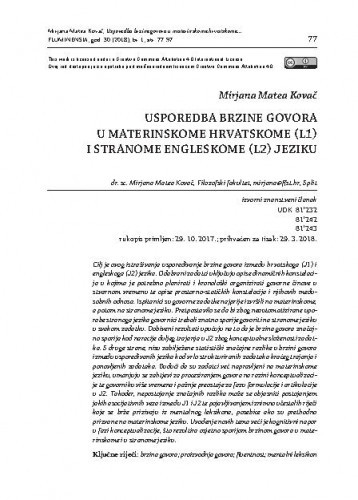Cilj je ovog istraživanja uspoređivanje brzine govora između hrvatskoga (J1) i engleskoga (J2) jezika. Odabrani zadatci uključuju opise dinamičnih konstelacija u kojima je potrebno planirati i kronološki organizirati govorne činove u stvarnom vremenu te opise prostorno-statičkih konstelacija i njihovih međusobnih odnosa. Ispitanici su govorne zadatke najprije izvršili na materinskome, a potom na stranome jeziku. Pretpostavilo se da bi zbog neautomatizirane uporabe stranoga jezika govornici trebali znatno sporije govoriti na stranome jeziku u svakom zadatku. Dobiveni rezultati upućuju na to da je brzina govora značajno sporija kod naracije duljeg trajanja u J2 zbog konceptualne složenosti zadatka. S druge strane, nisu zabilježene statistički značajne razlike u brzini govora između uspoređivanih jezika kod vrlo strukturiranih zadataka kraćeg trajanja i ponovljenih zadataka. Budući da su zadatci već napravljeni na materinskome jeziku, umanjuju se zahtjevi za procesiranjem govora na razini konceptualizacije te govorniku više vremena i pažnje preostaje za fazu formulacije i artikulacije u J2. Također, nepostojanje značajnih razlika može se objasniti postojanjem jakih asocijativnih veza između J1 i J2 te pojavljivanjem iznimno učestalih riječi koje se brže prizivaju iz mentalnog leksikona, posebice ako su prethodno prizvane na materinskome jeziku. Uvođenje novih tema veći je kognitivni napor u fazi konceptualizacije, što rezultira osjetno sporijom brzinom govora u materinskome i u stranome jeziku.; This paper aims at investigating the differences regarding speech rate between the Croatian (L1) and the English language (L2). The selected tasks include descriptions of dynamic entities which require careful planning and a chronological sequence of speech acts in real time, as well as the description of static spatial arrangements and their relations. The speech tasks were first performed in the native language, followed by the performance of the same tasks in the foreign language. A significantly faster speech rate was hypothesized in the foreign language condition for each investigated speech task due to the unautomated nature of L2 speech production mechanisms. The obtained results point to the conclusion that the speech rate is significantly slower in L2 in narrative tasks due to the conceptual complexity of the task. However, no significant differences in the speech rate were found between the two languages in the case of highly structured tasks with shorter duration, or in the case of repeated tasks. Due to the fact that the tasks have already been performed in the native language, the processing demands on the level of conceptualization decrease, freeing up the attentional resources, which, in turn, assist the formulation and articulation stage by reducing the processing pressure. Also, the fact that no significant differences were found might be explained by the existence of strong associative links between L1 and L2, as well as by the occurrence of highly frequent words which can be easily retrieved from the mental lexicon, especially if they have previously been activated in the native language. Introduction of new topics, on the other hand, implies higher cognitive demands in the conceptualization stage, resulting in a slower speech rate in both languages.
Sažetak

 Fluminensia : časopis za filološka istraživanja : 30,1(2018) / glavni i odgovorni urednik Aleksandar Mijatović.
Fluminensia : časopis za filološka istraživanja : 30,1(2018) / glavni i odgovorni urednik Aleksandar Mijatović.